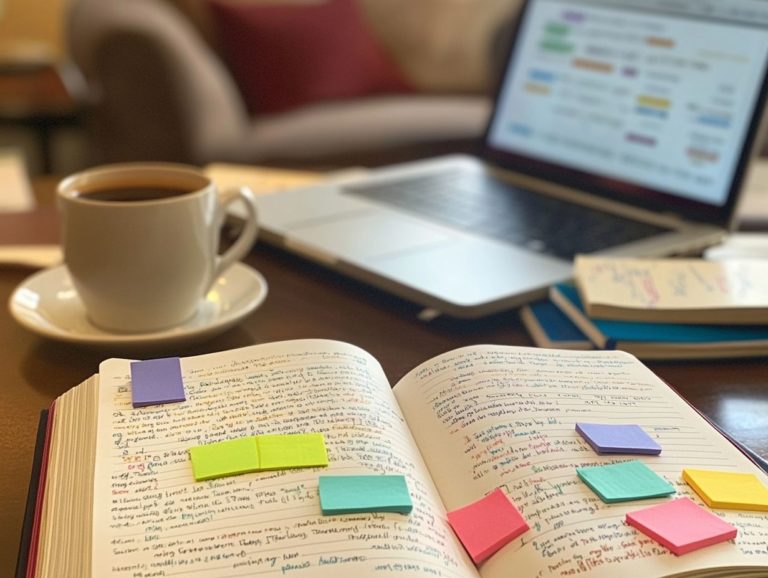how to improve your reading comprehension skills
Reading comprehension is an essential skill that influences every facet of your learning and communication. Whether you re a student grappling with intricate texts, a professional sifting through reports, or a casual reader immersed in a novel, truly understanding what you read is vital.
This article delves into the fundamental components of reading comprehension, examining both the internal and external factors that affect it. You ll find practical techniques designed to enhance your skills. From active reading strategies to conquering common obstacles, discover invaluable tips to elevate your comprehension and retention.
Dive in now to unlock the secrets of becoming an effective reader!
Contents
- Key Takeaways:
- Understanding Reading Comprehension
- Factors Affecting Reading Comprehension
- Techniques for Improving Reading Comprehension
- Practicing Reading Comprehension
- Improving Reading Speed and Efficiency
- Tips for Increasing Reading Speed
- Strategies for Retaining Information
- Overcoming Common Challenges in Reading Comprehension
- Frequently Asked Questions
- Want to improve your reading comprehension? Try these tips!
- How can I become a more active reader?
- Are there specific techniques to improve reading comprehension?
- Can reading different types of text improve my skills?
- How often should I practice reading comprehension skills?
- What are some good resources for practicing comprehension skills?
Key Takeaways:

Actively engage in reading by using strategies such as summarizing and questioning to improve comprehension.
Take effective notes while reading to better retain information and aid in understanding the text.
Practice reading comprehension through exercises and tests to strengthen skills and identify areas for improvement.
Understanding Reading Comprehension
Understanding reading comprehension is essential for achieving academic success. It involves not only grasping the meaning of texts but also analyzing content and connecting knowledge effectively.
Key components of reading comprehension include vocabulary, narrative understanding, and critical thinking.
By honing strong reading comprehension skills, you elevate your academic literacy, which is vital for engaging with complex texts across various genres, including literary masterpieces like Jane Austen’s ‘Pride and Prejudice.’
Academic institutions, such as the University of North Carolina, place significant emphasis on these skills to enhance student performance in assessments like the SAT and ACT.
What is Reading Comprehension?
Reading comprehension encompasses your ability to understand and interpret written texts, serving as a cornerstone for academic literacy. This skill not only aids you in grasping the explicit content of a text but also cultivates deeper analytical thinking and critical engagement with the material.
In academic settings, it enables you to effectively connect what you already know, allowing you to forge connections between new information and your prior understanding. As you navigate various learning styles, enhancing your comprehension skills becomes essential; it allows you to interact with diverse texts, grasp nuanced arguments, and ultimately excel in your studies.
By prioritizing reading comprehension, educational frameworks can profoundly influence your overall academic success and foster a commitment to lifelong learning.
Factors Affecting Reading Comprehension
Numerous factors influence your reading comprehension, involving a blend of external and internal elements that can either hinder or enhance your ability to grasp texts effectively.
External Factors
External factors that influence reading comprehension include instructional materials, educational resources, and classroom strategies that shape the learning environment.
These components are vital in shaping how you grasp complex texts, especially when considering the diverse learning needs among students. By implementing various teaching strategies, you can design dynamic lessons that resonate with multiple learning styles.
For example, integrating visual aids like charts or infographics can significantly enhance understanding for visual learners, while hands-on activities engage those who thrive on kinesthetic learning.
Targeted reading practice can effectively bridge gaps for struggling readers, fostering a more inclusive atmosphere in which every student can flourish. The right blend of resources ensures that comprehension isn t merely an aspiration; it becomes an achievable reality for all.
Internal Factors
Internal factors such as your metacognitive skills, learning styles, and self-monitoring abilities play a crucial role in how well you comprehend a text. These elements shape your engagement with the material and influence how you approach, interpret, and retain information.
Effective self-monitoring helps you recognize when a passage doesn t make sense, prompting you to pause and re-evaluate your strategies. Integrating your prior knowledge fills comprehension gaps and makes the reading experience more relatable.
Recognizing your unique learning style shows the need for adaptive teaching methods. Understanding your preferences can reduce comprehension barriers and enhance your literacy outcomes.
Techniques for Improving Reading Comprehension

Using a range of techniques can elevate your reading comprehension, transforming passive reading into an active and engaging endeavor.
Active Reading Strategies
Active reading strategies, such as annotating text and summarizing key points, are essential for enhancing comprehension and nurturing critical thinking skills. Engaging dynamically with the material boosts your understanding and retention.
Techniques like highlighting phrases, jotting down questions, and creating mind maps turn reading into an interactive experience. When encountering essential concepts, relate them to your prior knowledge or discuss them with peers to deepen insights.
Regular review sessions with flashcards or concise notes will solidify your comprehension skills, making your reading experience enjoyable and productive.
Effective Note-Taking
Effective note-taking is vital for enhancing reading comprehension. It allows you to organize thoughts and retain important information. This structured approach helps grasp complex material and fosters active engagement.
By using various note-taking methods like flashcards for quick recall or study guides for key concepts you can tailor your study practices to your learning style.
These techniques promote academic literacy and serve as invaluable strategies that elevate your overall learning experience.
Practicing Reading Comprehension
Engaging in reading comprehension exercises and diverse assignments is essential for cultivating strong comprehension skills and preparing for assessments.
This practice enhances understanding and equips you with the tools needed to excel in evaluations.
Utilizing Practice Tests and Exercises
Using practice tests and exercises reinforces comprehension skills and provides valuable feedback to gauge understanding.
These assessments are crucial for enhancing your skills and pinpointing areas needing focus. Engaging with practice questions helps you monitor progress and adapt study strategies as needed.
These tests mimic real exam conditions, helping to reduce anxiety and bolster confidence for actual assessments. By tackling various formats and topics, you ll cultivate critical thinking key components of academic literacy.
In this way, practice tests become integral to your learning journey, guiding you toward academic success.
Improving Reading Speed and Efficiency
Enhancing reading speed and efficiency is crucial, especially in academic life. This skill allows you to absorb information swiftly without sacrificing comprehension.
Improving these skills enables you to navigate your studies with greater ease and confidence.
Tips for Increasing Reading Speed

Boost your reading speed today! Consider incorporating regular reading practice and utilizing visual aids. Employ techniques like grouping information to enhance your comprehension.
Setting specific goals can be incredibly beneficial for monitoring your progress and maintaining motivation. For example, introducing timed reading sessions can significantly improve your ability to process information more swiftly.
Reading different materials like articles, novels, and reports boosts your vocabulary and comprehension. Adding note-taking to your routine reinforces your understanding and retention of the material.
By blending these approaches, you can transform your reading habits, leading to more efficient reading and deeper insights into what you consume.
Strategies for Retaining Information
To retain information effectively, use strategies like flashcards, study guides, and summarizing content to reinforce your understanding.
Integrating active learning methods, such as teaching others or participating in group discussions, can elevate your academic literacy.
Visual aids like mind maps or diagrams enhance your visual comprehension, transforming complex information into more digestible formats.
Establishing a regular study routine promotes better retention by systematically reinforcing knowledge over time. When you apply these diverse strategies, you ll likely find your comprehension skills improve, allowing you to grasp and recall information with greater efficiency.
These approaches support your learning journey and bolster your confidence in tackling academic challenges.
Overcoming Common Challenges in Reading Comprehension
Overcoming common challenges in reading comprehension is crucial for your academic success. It involves using effective strategies to handle difficult texts and managing time constraints skillfully.
By honing these skills, you position yourself for a more rewarding and productive learning experience.
Dealing with Difficult Texts
Dealing with difficult texts requires specific reading techniques that enhance understanding, even when comprehension barriers loom large.
Employ strategies like skimming for main ideas, highlighting key phrases, and jotting down notes in the margins to engage more deeply with the material.
Breaking down complex sentences into bite-sized parts and summarizing sections in your own words illuminates challenging concepts.
Using graphic organizers to outline arguments or themes turns overwhelming information into a visual framework, making it easier to retain and clarify what you’ve learned.
Engaging in discussions or seeking clarification on elusive ideas helps bridge gaps in your understanding, fostering a more confident approach to tackling challenging literature.
Managing Time Constraints
Managing time constraints effectively is essential for optimizing your reading efficiency and enhancing overall academic literacy.
In today s fast-paced educational landscape, balancing multiple assignments, extracurricular activities, and personal commitments is often a reality. Implementing structured time management techniques is crucial.
Prioritizing your reading tasks based on deadlines and importance allows you to allocate time wisely and significantly reduce stress. Consider breaking down your reading materials into manageable segments, setting specific time limits for each segment, and using tools like digital timers for focused reading sessions.
Incorporating strategies such as summarizing and note-taking further enhances your comprehension and retention, ensuring that the time you invest in reading translates into meaningful learning.
Frequently Asked Questions
Want to improve your reading comprehension? Try these tips!

Some tips for improving reading comprehension skills include practicing active reading, breaking down complex sentences, and using reading comprehension tips for ACT success to summarize what you’ve read.
How can I become a more active reader?
Engage with the text by making predictions and asking questions. Summarize key points to enhance your understanding.
Are there specific techniques to improve reading comprehension?
Yes! Use context clues these are hints in the text that help you understand better. Visualizing the text and connecting it to your experiences also work wonders.
Can reading different types of text improve my skills?
Absolutely! Reading a mix of fiction, non-fiction, and articles exposes you to various writing styles and subjects, boosting your comprehension.
How often should I practice reading comprehension skills?
You should practice your reading skills a few times each week to see fast improvements! Regular practice is key.
What are some good resources for practicing comprehension skills?
There are plenty of resources! Look for online exercises, reading workbooks, or consider working with a tutor or teacher.






